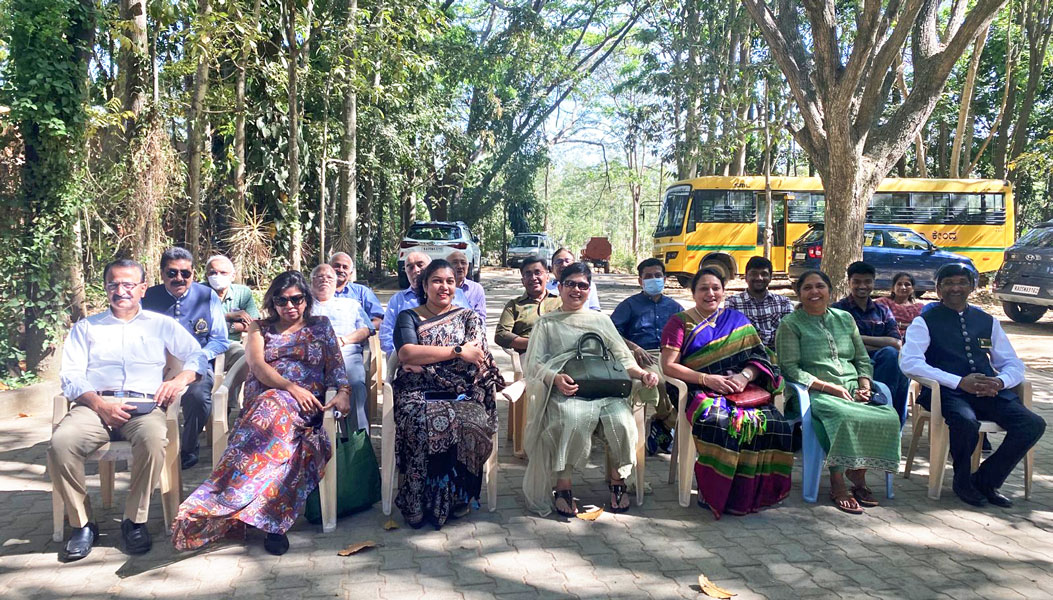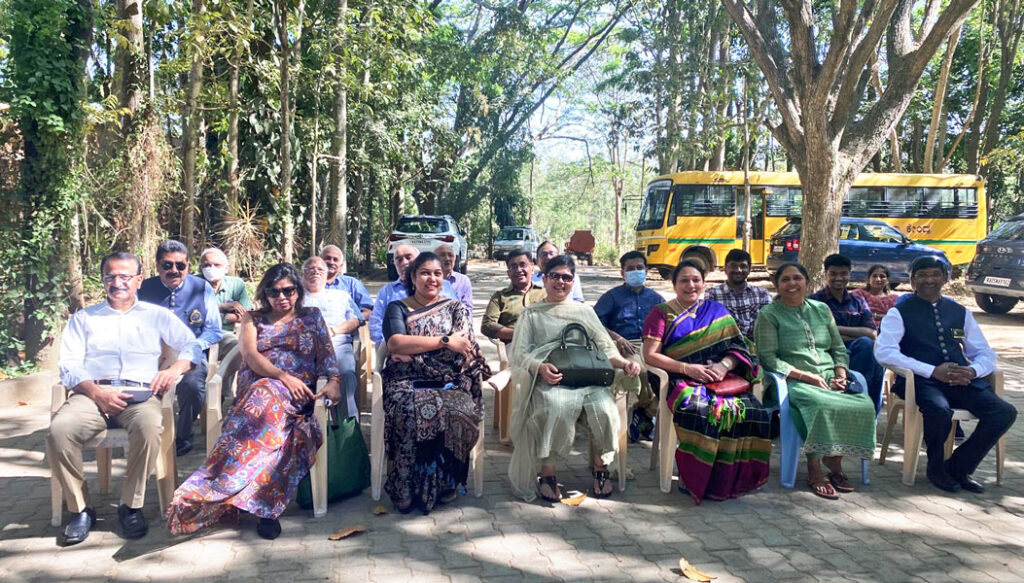
While Rotary clubs are active in cities and major towns, not much is being done in the remote villages of Karnataka, feels T Srikanth Bhagavat, president, RC Bangalore Midtown, RID 3190. “I always felt that rural areas are getting the short end of the stick as all development is focused in urban clusters. But doing a clutch of Rotary projects at some villages is not enough. Our Project Happy Halli (village in Kannada) is designed to provide an integrated, 360-degree development to villages through a series of programmes and infrastructure building across all the seven focus areas of Rotary to create sustained happiness among villagers,” he says.
In the first phase of Happy Halli, the club entered into a tripartite MoU with the Ramakrishna Mission and the state government’s Rural Development and Panchayat Raj department to create a holistic ecosystem to ensure sustainable livelihoods for those at Shivanahalli village, Anekal taluk (Bengaluru rural). A primary school, Sri Sarada Devi Vidya Kendra being run by the Mission got CBSE affiliation and was upgraded to high school-level. Two new blocks were built, the former sponsored by Sudha Murthy from the Infosys Foundation and the latter through contributions from Ramakrishna devotees and other donations.
“We flagged off two 50-seater buses (₹45 lakh) to transport children from their homes to this school and back. There is no school at all in a 20km radius from this village. Now the student strength can go up from 300 to 800,” explains Bhagavat. The club has applied for a global grant to provide lab equipment worth ₹30 lakh to the revamped school and Montessori tools to aid classroom learning will be procured at a cost of ₹4 lakh.
A healthcare centre run by the Mission has voluntary doctors and nurses who earlier visited the facility only on Sundays which could hardly serve the medical needs of the villagers. “So we set up a telemedicine clinic worth ₹6.5 lakh in partnership with the Oxford Medical College and Hospital, Attibele. They provide the doctors to offer eleconsultation to patients on a daily basis and also conduct health camps at Shivanahalli and nearby villages. The required software to maintain patient records was donated by YouSee, an NGO.”
A 75,000-litre capacity tank will provide drinking water to 1,400 villagers. “We are providing vocational skills like tailoring to women at an existing centre and will try and get bulk orders for them, mostly school uniforms, to ensure regular income for them. Right now, 10 women at Shivanahalli are doing job orders, including the one for delivering uniforms to two schools being run by our club,” says Namrataa Bhatia, club secretary. Sansera Engineering of Rtn F R Singhvi is training school and college dropouts to operate CNC machines, and they will be employed later.
Recalling the origin of Project Happy Halli, Bhagavat says, “we hired a team of sociologists to a ‘needs assessment’ study at Shivanahalli. They came out with a detailed report on demographics, civic amenities and livelihood needs which can be fulfilled through Rotary projects.” While the total cost of ₹1 crore for the first phase of the project is being met mostly through member contributions, “we are ready to replicate Happy Halli across 100 villages in the next 10 years.”
eMaanasi: Mental wellness
During a visit to her native place, RID 7130 IPDG Dr Geeta Jayram from Baltimore, US, found the villagers, mostly women, suffering from mental and psychological problems. With the support of RC Bangalore Midtown and technical know-how from St John’s Medical College Hospital, she set up a community mental health clinic, Maanasi, at Mugalur village in Anekal taluk in 2001. The centre is also mentored by the researchers at the Johns Hopkins Hospital, Baltimore, US. “Around 1,200 patients are being treated for psychiatric diseases at the clinic. The health workers visit patients at their doorsteps to ensure compliance and empathy during treatment,” says Ramesh Bulchandani, project chair.
Following the success of the Maanasi clinic, its first branch was set up last year at the HSIS dispensary run by the club at Frazer Town in North Bengaluru. In 2011, the club shot a documentary film on Maanasi which was appreciated by the RI Board and WHO for “amplifying the reach of critical, but limited resources of psychiatrists for sustainable treatment of patients suffering from neurological problems.”
Now the club has developed a software, eMaanasi, costing ₹80 lakh to provide global benchmarks in the treatment of mental and psychological problems. “Any club in the world can replicate our mental healthcare project using this tech platform by setting up either a brick and mortar clinic or through telemedicine,” says Bulchandani.
Brain Health Initiative
An MoU was signed between the club and Nimhans, Bengaluru, in the presence of RI President Shekhar Mehta at a TRF dinner event, to conduct a series of brain health workshops, yoga camps and other special events which will create awareness on taking care of our neurological system. “Nimhans wants to develop a hub and spoke model by training staff at the PHCs to detect and treat psychiatric illness. Our focus will be on preventive care,” says Bhagavat. The state government and planning body Niti Aayog have lent support to this pilot project which will be executed at two places — one in Bengaluru South (urban) and the other at a village in Chikkaballapur district.
Brain Health Initiative, as a one-year pilot project, will identify people with neurological symptoms through special camps. “Later we will focus on their treatment and rehabilitation,” says Nadeem Ahmed, club treasurer and trustee, Rotary Midtown Charitable Trust. “While MCKS, a local NGO, will contribute ₹40 lakh, another ₹10 lakh will be from our club.” The 45-year-old, 100 per cent PHC club has 104 members who are the pillars behind the success of its multifaceted projects across verticals, adds Ahmed.






